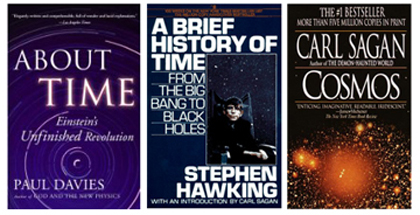A few weeks ago J. C. Hutchins wrote a post on Tor.com about how science fiction authors can benefit from reading other genres. I couldn’t agree more and thought I’d point out a few of my favorite non sci-fi reads. Although most of my writing is in the realm of comedy or satire, not counting “Adventures of the Floating Elephant” over at Activatecomix, I actually enjoy curling up with factual books about time, space and quantum theory. Don’t misunderstand me, I’m no rocket scientist, and I certainly have no idea what all those elaborate equations on the black boards of scientists mean, but I’m fascinated by theories about how our universe works.
My love for all things science fact started back in the very early eighties with Carl Sagan’s Cosmos. I never missed an episode of that show while in junior high. Secrecy was the name of the game back then of course. I’d have to watch a few snippets of The Dukes of Hazzard so I could interact with other kids in 8th grade. It was important they never know of my secret love, Carl Sagan. After Cosmos ended I lapsed back into high school concerns and my mundane activities of planet Earth. It wasn’t until a few years later that Stephen Hawking became known to the general public due to his popular and bestselling book, A Brief History of Time. I was probably being a bit of a sheep when I bought the book, but it was so nice to do so out in the open in front of all the other normal people. That was one less category of book to hide thanks to Mr. Hawking! I still had to keep my comic books hidden in those days before graphic novels were “cool.”
As I read A Brief History I was reminded of all the magic and wonder of Cosmos. Again, his books are written so the common blockhead like myself can grasp a hint of how physics work, or how we think it works at least. I never knew I could meditate over and enjoy a book as much as I did when I first read Hawking’s book. Of course he talked about all the phenomena that was the basic fodder of so much of my sci-fi reading or movie going. Black holes, the speed of light, particles traveling backward in time as they come OUT of a black hole! What?? Even as a kid I knew that the movie The Black Hole was of questionable quality, but I oh so wanted it to be good. Reading about the real thing, or what we believe the real thing could be like, was so much more satisfying than any fictional black hole story I’ve ever seen or read.
After that I found a book by Paul Davies called About Time. Another book I loved to read repeatedly. Who thought a whole book mostly about time would be so fascinating? I’ll admit I had to read the parts of this book involving beam splitting and photons a few times before I actually understood what was being explained. Likewise, I still have a hard time understanding what “imaginary numbers” are all about. If any one can explain that one please feel free. Anyone? I recommend this book to anyone out there with an interest in the Heisenberg uncertainty principle, quantum mechanics, or tachyons. Do tachyons travel backward in time?! You’ll have to read the book to find out.
Another book by Davies is Are We Alone, which is a quick read to remind us of how hard it would really be to find intelligent life out there in the haystack of the galaxy. Or rather, if there is life out there, we are also a tiny needle that they may never find. I haven’t read them all, but Davies has a few other books about physics out there. You can easily find them with that Google thing everyone is using. I find he keeps the techno-babble to minimum for non-quantum physicists like me.
Recently I bought a Michio Kaku book, Hyperspace. I’ve seen Kaku on every other episode of NOVA whenever the show is about the universe or time warps. I’m enjoying his take on the fifth dimension and the theory that there are, or were, ten dimensions, but I’m not smart enough to tell you his “ten dimension” theory is B.S. or genius. I guess that’s the wiggle room where science fiction takes place. Five dimensions? Ten dimensions? Or maybe we’re all just inside a computer program. New scientific discoveries are like seeds for the next generation of fantasy and or science fiction writers. What will authors be writing about after the Large Hadron Collider is up and running at full capacity and we learn who knows what, from this giant particle accelerator.
In the mean time, if anyone knows of a good science, or science fiction, book out there that makes sense of imaginary numbers, let me know.
Tim Hamilton is an artist who has adapted Treasure Island and, most recently, Fahrenheit 451 into graphic novels. He is also a founder of the Act-I-Vate comix collective.










